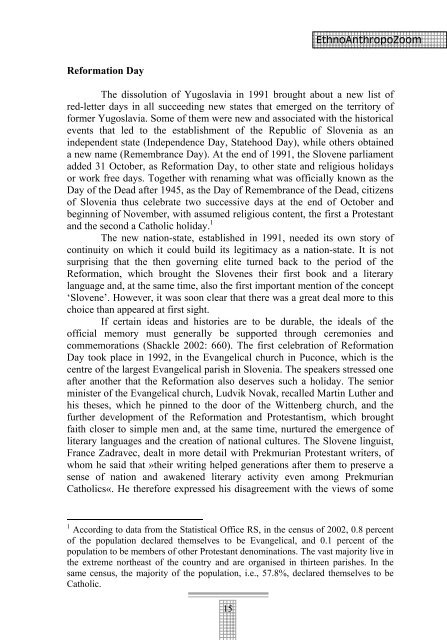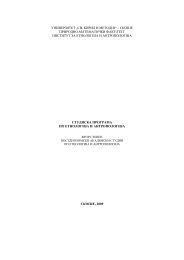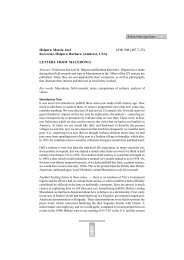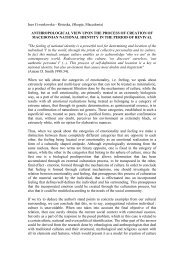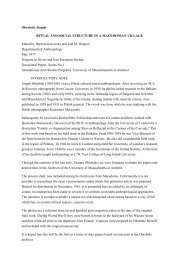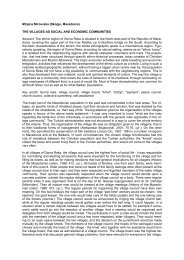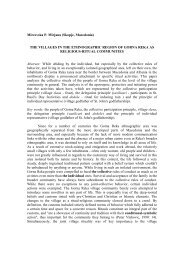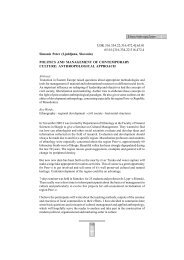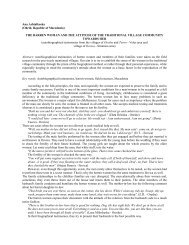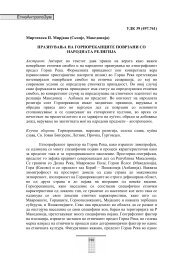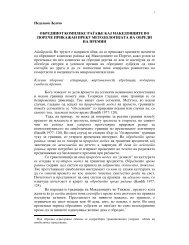Jezernik, Bozidar (Slovenia), The Red and the Black
Jezernik, Bozidar (Slovenia), The Red and the Black
Jezernik, Bozidar (Slovenia), The Red and the Black
You also want an ePaper? Increase the reach of your titles
YUMPU automatically turns print PDFs into web optimized ePapers that Google loves.
EthnoAnthropoZoom<br />
Reformation Day<br />
<strong>The</strong> dissolution of Yugoslavia in 1991 brought about a new list of<br />
red-letter days in all succeeding new states that emerged on <strong>the</strong> territory of<br />
former Yugoslavia. Some of <strong>the</strong>m were new <strong>and</strong> associated with <strong>the</strong> historical<br />
events that led to <strong>the</strong> establishment of <strong>the</strong> Republic of <strong>Slovenia</strong> as an<br />
independent state (Independence Day, Statehood Day), while o<strong>the</strong>rs obtained<br />
a new name (Remembrance Day). At <strong>the</strong> end of 1991, <strong>the</strong> Slovene parliament<br />
added 31 October, as Reformation Day, to o<strong>the</strong>r state <strong>and</strong> religious holidays<br />
or work free days. Toge<strong>the</strong>r with renaming what was officially known as <strong>the</strong><br />
Day of <strong>the</strong> Dead after 1945, as <strong>the</strong> Day of Remembrance of <strong>the</strong> Dead, citizens<br />
of <strong>Slovenia</strong> thus celebrate two successive days at <strong>the</strong> end of October <strong>and</strong><br />
beginning of November, with assumed religious content, <strong>the</strong> first a Protestant<br />
<strong>and</strong> <strong>the</strong> second a Catholic holiday. 1<br />
<strong>The</strong> new nation-state, established in 1991, needed its own story of<br />
continuity on which it could build its legitimacy as a nation-state. It is not<br />
surprising that <strong>the</strong> <strong>the</strong>n governing elite turned back to <strong>the</strong> period of <strong>the</strong><br />
Reformation, which brought <strong>the</strong> Slovenes <strong>the</strong>ir first book <strong>and</strong> a literary<br />
language <strong>and</strong>, at <strong>the</strong> same time, also <strong>the</strong> first important mention of <strong>the</strong> concept<br />
‘Slovene’. However, it was soon clear that <strong>the</strong>re was a great deal more to this<br />
choice than appeared at first sight.<br />
If certain ideas <strong>and</strong> histories are to be durable, <strong>the</strong> ideals of <strong>the</strong><br />
official memory must generally be supported through ceremonies <strong>and</strong><br />
commemorations (Shackle 2002: 660). <strong>The</strong> first celebration of Reformation<br />
Day took place in 1992, in <strong>the</strong> Evangelical church in Puconce, which is <strong>the</strong><br />
centre of <strong>the</strong> largest Evangelical parish in <strong>Slovenia</strong>. <strong>The</strong> speakers stressed one<br />
after ano<strong>the</strong>r that <strong>the</strong> Reformation also deserves such a holiday. <strong>The</strong> senior<br />
minister of <strong>the</strong> Evangelical church, Ludvik Novak, recalled Martin Lu<strong>the</strong>r <strong>and</strong><br />
his <strong>the</strong>ses, which he pinned to <strong>the</strong> door of <strong>the</strong> Wittenberg church, <strong>and</strong> <strong>the</strong><br />
fur<strong>the</strong>r development of <strong>the</strong> Reformation <strong>and</strong> Protestantism, which brought<br />
faith closer to simple men <strong>and</strong>, at <strong>the</strong> same time, nurtured <strong>the</strong> emergence of<br />
literary languages <strong>and</strong> <strong>the</strong> creation of national cultures. <strong>The</strong> Slovene linguist,<br />
France Zadravec, dealt in more detail with Prekmurian Protestant writers, of<br />
whom he said that »<strong>the</strong>ir writing helped generations after <strong>the</strong>m to preserve a<br />
sense of nation <strong>and</strong> awakened literary activity even among Prekmurian<br />
Catholics«. He <strong>the</strong>refore expressed his disagreement with <strong>the</strong> views of some<br />
1 According to data from <strong>the</strong> Statistical Office RS, in <strong>the</strong> census of 2002, 0.8 percent<br />
of <strong>the</strong> population declared <strong>the</strong>mselves to be Evangelical, <strong>and</strong> 0.1 percent of <strong>the</strong><br />
population to be members of o<strong>the</strong>r Protestant denominations. <strong>The</strong> vast majority live in<br />
<strong>the</strong> extreme nor<strong>the</strong>ast of <strong>the</strong> country <strong>and</strong> are organised in thirteen parishes. In <strong>the</strong><br />
same census, <strong>the</strong> majority of <strong>the</strong> population, i.e., 57.8%, declared <strong>the</strong>mselves to be<br />
Catholic.<br />
15


